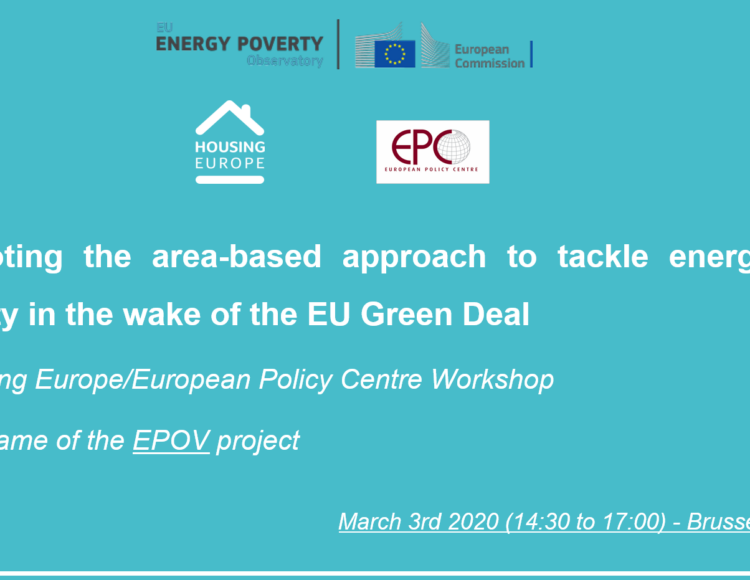a Housing Europe/European Policy Centre Workshop in the frame of the EPOV project on March 3rd, 14:30-17:00. Venue: European Policy Centre, Rue du Trône 14, 1000 Bruxelles.
Background
It has become evident that energy poverty is one of the most alarming phenomena of our times, affecting around 11% of Europeans. Eurostat (2012) shows that 87 million people live in poor quality dwellings, 54 million people cannot keep their home adequately warm and 161 million face disproportionate housing expenditure.
At the same time, the number of people with complex housing needs in Europe is increasing, especially in those countries hit most by the financial crisis. In Greece, for instance, according to the latest European Parliament survey, 36% of households suffer from energy poverty, while tens of thousands of them have no access to power and/or heating.
There is no doubt that the challenge is multifaceted, characterized by poor energy efficient homes, rising energy prices and low income. Home owners and providers across Europe face different challenges from financing energy efficient renovations to providing additional services to tenants.
This challenge has been recognised by the European Commission in the EU Green Deal, since it says that “Particular attention will be paid to the renovation of social housing, to help households who struggle to pay their energy bills”.
In order to both achieve the targets and leave no one behind, more effective solutions should put in place to motivate Member States seeing the energy efficient renovation as part of future-proof and sustainable neighbourhoods. Stakeholders from all levels should come together to discuss next steps not only in terms of renovation techniques, financial incentives but also about the co-creation methods and energy advice. Therefore, Housing Europe and the European Policy Centre proposes a workshop in cooperation with the European Union energy poverty observatory focusing on the European perspective with the aim to discuss
• How are EU funding schemes fostering the tackling of energy poverty?
• How to improve financial tools to address the whole neighbourhood/district?
• What is the role of innovation/RES?
• How do we upscale to achieve affordability for the providers?
• How could decentralised energy become a reality?
Agenda
Moderation: Ms. Claire Dheret, Head of Programme, Social Europe and Well-being, European Policy Centre
14:30-15:00 Introduction
- Main activities and findings of the EU Energy Poverty Observatory, by Dr. Stefan Bouzarovski, University of Manchester and Chair of the EU Energy Poverty Observatory
15:00- 15:45 Why is the area-based approach relevant to tackle energy poverty?
Decentralised energy production
- ASTER, a financing scheme for renewable energies in the social housing sector, by Bjorn Mallants, VVH Flanders
The role of energy advice to housing providers and tenants at neighbourhood level
- The role of local authorities’ energy planning, by Giustino Piccolo, Covenant of Mayors EU Office
- A one-stop shop approach: OPENGELA project in Bilbao, by Andoni Hidalgo, Euroiker / Gabineteseis
Social housing providers and the fight against energy poverty
- Innovative solutions to district approach in the social housing sector, by Sebastien Garnier, Innovation manager, Housing Europe
15:45-16:45 What can the EU do to promote the area-based approach? How will the EU Green Deal include the most vulnerable?
- Panel participants: Wim Hazeu, CEO Wonen Limburg; Gordon Sutherland, Head of Sector for buildings, heating & cooling, EASME; Charles Roarty, Energy Action Ireland; Ciarán CUFFE, Member of the European Parliament
16:45 – 17:00: Conclusions and way forward
- Sorcha Edwards, Secretary General of Housing Europe
